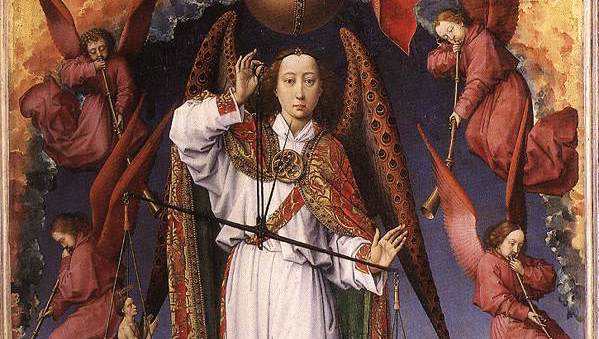Resuming our series on the “Sword of St. Michael,” we move from ancient Jewish texts to Christian ones and examine what important roles St. Michael had in early Christian history.
[featured-image single_newwindow=”false”]
Similar to the Jewish approach to St. Michael, Christians believed the holy archangel was responsible for key moments in the lives of the early Christians as well as future eschatological events. These traditions are best summarized by the four offices of St. Michael.
First of all, Christians assigned to St. Michael the duty of conveying souls from this life to the next. The most notable person that St. Michael brought up to Heaven was the Blessed Virgin Mother on the day of her Assumption.
This role of St. Michael is further confirmed in the offertory chant sung during a Requiem Mass.
O Lord Jesus Christ, King of glory,
deliver the souls of all the faithful departed
from the pains of hell and from the bottomless pit:
deliver them from the lion’s mouth,
that hell swallow them not up,
that they fall not into darkness,
but let the standard-bearer holy Michael
lead them into that holy light:
Which Thou didst promise of old to Abraham and to his seed.
In a similar vein St. Michael is seen as the angel who the greets the soul at their judgement and weighs their good deed and bad deeds on a scale. For this reason St. Michael is frequently depicted in statues or paintings holding scales.
Besides being present at death, St. Michael is more widely known as the protector of the Church and individual souls. Just as St. Michael was the angel that led the People of Israel through the desert, so now the archangel leads the Church in its pilgrimage towards Heaven.
St. Michael excels in this role, in particular as a fierce defender against Satan and any evil influence. The popular “St. Michael Prayer” best summarizes this office.
On account of his role in casting out Satan from Heaven, St. Michael is also believed to be the one who will destroy the Antichrist at the end of time. The Golden Legend explains what Christians have believed for many centuries.
[I]n the time of the Antichrist Michael will rise up and stand forth as defender and protector of the elect. He it was who fought with the dragon and his angels and expelled them from heaven, winning a great victory … He is held to be Christ’s standard-bearer among the battalions of the holy angels. At the Lord’s command he will kill the Antichrist with great power on Mount Olivet. At the sound of the voice of the archangel Michael the dead will rise, and it is he who will present the cross, the nails, the spear, and the crown of thorns at the Day of Judgment.
These varying roles or offices of St. Michael are best described by Richard F. Johnson, who summarized them in his book St. Michael the Archangel in Medieval English Legend.
- The first is to do battle again Satan and his minions
- The second is to be the untiring champion of God’s chosen people
- The third office is to protect the souls of the faithful from the influence of the devil, especially at the moment of death
- And the fourth office is to call away men’s souls from their earthly life and bring them to judgment
However, that is not the end of the story. In Christian tradition St. Michael has appeared to humanity on multiple occasions. In our next article, we will start to unravel St. Michael’s visitations to the world, where they were and what messages he conveyed to us.
Read More: Coincidence or providence? How St. Michael became protector of seven mountains

